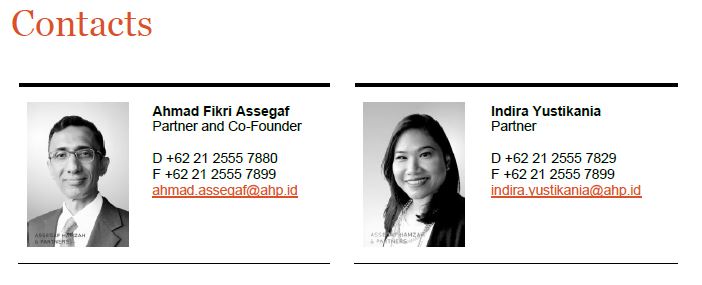After Push from the Industry, Government Relaxes the Foreign Ownership Restrictions in Insurance Companies
Previously, recognising the role of foreign insurance companies and foreign investors with their capital, experience and technology, the Indonesian government issued Government Regulation No. 14 of 2018 (“Regulation 14/2018“) to allow up to 80% of foreign ownership in a non-publicly listed insurance company. Recently, this allowance was relaxed even further under Government Regulation No. 3 of 2020 (“Regulation 3/2020“), which allows a foreign investor to hold more than 80% of the shares of a non-publicly listed insurance company in Indonesia.
Foreign Ownership Limit
Under Regulation 14/2018, foreign citizens and entities were precluded from owning more than 80% (“Foreign Ownership Limit“) of the paid-up capital of an insurance company (which covers a non-publicly listed insurance company, Sharia insurance company, reinsurance company, Sharia reinsurance company, insurance brokerage company, reinsurance brokerage company and insurance loss adjuster company). If an insurance company wishes to increase its paid-up capital, at least 20% of the additional paid-up capital must be obtained from an Indonesian entity and/or citizen, or through an initial public offering (“IPO“) in Indonesia.
In Regulation 3/2020, this exclusion was clarified and in effect, a non-publicly listed insurance company whose foreign ownership has exceeded the 80% threshold will be exempted from the Foreign Ownership Limit. This means that foreign investors can increase their shareholding in proportion to their existing ownership percentage.
Illustration
In Regulation 14/2018, an insurance company that has exceeded the Foreign Ownership Limit on the date that Regulation 14/2018 came into force may be exempted from the Foreign Ownership Limit provided that its then foreign ownership percentage does not increase. As such, a non-publicly listed insurance company with an 85% foreign shareholding at the date when Regulation 14/2018 came into force may continue to retain that foreign shareholding percentage.
Nevertheless, as Regulation 14/2018 prescribes that at least 20% of the additional paid-up capital must be obtained from an Indonesia legal entity and/or citizen or through an IPO, the foreign shareholders in the said company may subsequently end up holding less than 85% of the share capital post-capitalisation. This is because foreign shareholders are not permitted to subscribe for additional shares in accordance with their existing shareholding percentage pre-capitalisation.
With the introduction of Regulation 3/2020, foreign shareholders may continue to retain their 85% shareholding as at the date the Regulation 3/2020 came into force even after the proposed additional capitalisation, provided that an Indonesian citizen and/or legal entity subscribes for the remaining 15% of the additional capital. If, however, no Indonesian citizens and/or legal entities participate in the capital increase, the capital increase must be conducted through an IPO in Indonesia.
Applicability of the Foreign Ownership Limit
Under Regulation 14/2018, the Foreign Ownership Limit only applied to the insurance companies mentioned above. However, Regulation 3/2020 has expanded the applicability of the Foreign Ownership Limit (and the associated exemptions as set out above) to Sharia insurance companies and Sharia reinsurance companies resulting from a spin-off of a Sharia unit.
By way of illustration, if the Sharia insurance company or Sharia reinsurance company with 88% foreign shareholding has been exempted from the Foreign Ownership Limit, the foreign ownership percentage of the Sharia insurance company or Sharia reinsurance company resulting from a spin-off of a Sharia unit must not exceed 88%.
Conclusion
The enactment of Regulation 3/2020 received a warm welcome from the insurance industry, which has long accepted that development in the industry cannot rely solely on domestic investment. It is hoped that the government’s recognition of this fact, and the accommodation made by it to solve the needs of domestic insurance companies will allow the local insurance industry to achieve and continue good sustainability and stability.

***
AHP Client Alert is a publication of Assegaf Hamzah & Partners. It brings an overview of selected Indonesian laws and regulations to the attention of clients but is not intended to be viewed or relied upon as legal advice. Clients should seek advice of qualified Indonesian legal practitioners with respect to the precise effect of the laws and regulations referred to in AHP Client Alert. Whilst care has been taken in the preparation of AHP Client Alert, no warranty is given as to the accuracy of the information it contains and no liability is accepted for any statement, opinion, error or omission.

